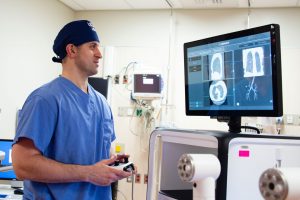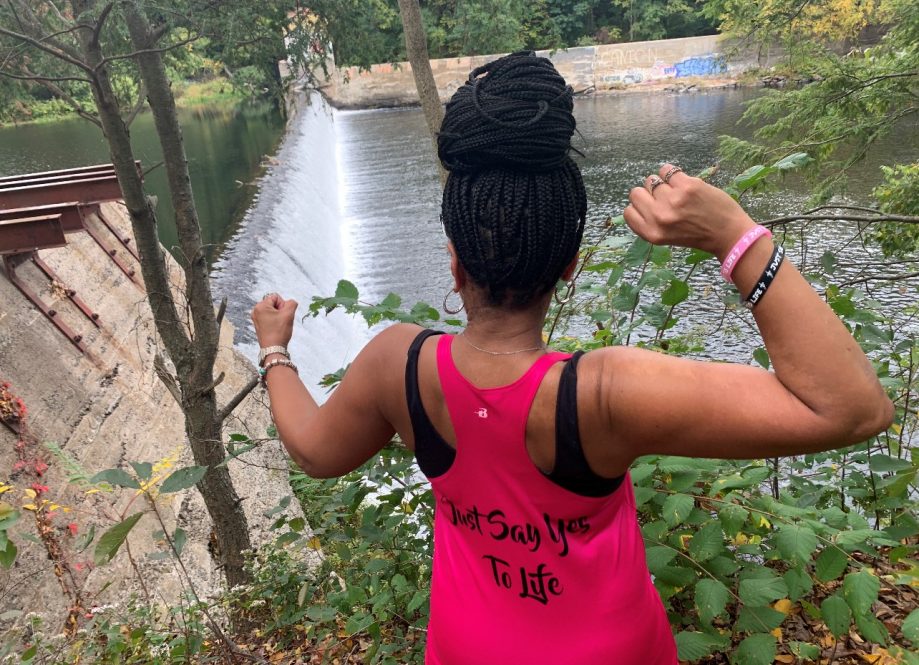UConn Health Hospital Emergency Operator Pat Davis is often calling codes to help save other people’s lives, and she credits Dr. Omar Ibrahim, director, Interventional Pulmonary for saving hers.
At an annual check-up her primary care physician, Dr. Beatriz Tendler, associate professor of Medicine, Section of Hypertension and Vascular Diseases, Endocrine Neoplasia Service at UConn Health asked her if there was anything new or concerning she should be aware of. Davis mentioned that sometimes at night she was having a little discomfort when lying down, almost like mild indigestion. Tendler sent her for a CT Scan that day so they could see what might be the issue. That night shortly after 10 p.m., Davis received a call from Tendler stating that she was referring her to Ibrahim in pulmonology.
“I knew right then that something was wrong,” says Davis.

When Ibrahim reviewed the scan he was 99% sure by looking at it that it was cancer.
“Once he said ‘cancer,’ I didn’t hear anything else. I got very emotional and he was very comforting,” says Davis. “He and his nurse took me into another room and he said ‘we are going to get through this together.’”
Ibrahim gave her options and told her he would leave it up to her to choose, but warned her not to take too much time making a decision as the cancer was caught early enough it could be treated.
Lung cancer is by far the leading cause of cancer death, making up almost 25% of all cancer deaths. Each year, more people die of lung cancer than of colon, breast, and prostate cancers combined according to the American Cancer Society (ACS).
People who smoke have the greatest risk of lung cancer, though lung cancer can also occur in people who have never smoked. The risk of lung cancer increases with the length of time and number of cigarettes you’ve smoked. If you quit smoking, even after smoking for many years, you can significantly reduce your chances of developing lung cancer.
ACS advises that health care providers, and people at increased risk for lung cancer, follow the recently updated recommendations for annual lung cancer screening from the US Preventive Services Task Force (USPSTF), the American Academy of Family Physicians (AAFP), or the American College of Chest Physicians:
These organizations recommend yearly lung cancer screening with low dose CT scans for people who:
Are 50 to 80 years old and in fairly good health,
and
Currently smoke or have quit in the past 15 years,
and
Have at least a 20 pack-year smoking history. (This is the number of packs of cigarettes per day multiplied by the number of years smoked. For example, someone who smoked 2 packs a day for 10 years [2 x 10 = 20] has 20 pack-years of smoking, as does a person who smoked 1 pack a day for 20 years [1 x 20 = 20].)
“The goal of the CT scan is to catch cancer in its infancy so you can treat and remove it,” says Ibrahim.
The best chance to beat lung cancer is to remove it through resection or removal of part of the lung. This standard of care is completed by a surgeon who will do a segmentectomy or lobectomy to remove the parts of the lung with cancer.
After discussing with her family, Davis chose to have a wedgectomy, and two spots on her lung, one which was cancerous were removed.

“About four years ago here at UConn Health, we chose to push the envelope in the Hartford area to be on the cutting edge of treating patients with lung cancer,” says Ibrahim. “We were the first in CT and New England to use a robotic bronchoscopy, a small scope that can reach small nodules in the lung and find cancer early. Since then we are advancing with a cone CT Scan used in conjunction with the bronchoscopy.”
However, lung cancer is often found in later stages for those not regularly screened and those patients are not eligible or able to have the surgery.
“What sets us apart here at UConn Health is the ability to think about tomorrow and how we are going to treat patients who can’t be treated with surgery,” says Ibrahim. “Some patients have recurrence or can’t have surgery because lung function is too poor, so we are looking to treat patients with minimally invasive techniques using the bronchoscopy to inject chemotherapy and immune agents into the tumor and in a few months starting a clinical trial using a heat modality through ablation technology to remove the tumor.”
While Davis isn’t sure where her lung cancer originated from, she did smoke earlier in her life but quit over 20 years ago. She is very active, enjoys dancing and keeping up with her grandchildren, so she never thought that discomfort in her chest was lung cancer as she had no other symptoms.
“You have to be an advocate and vigilant about your health, had I not said anything about that discomfort in my chest and the doctor hadn’t ordered a CT Scan, I don’ think I would be here,” says Davis. “Dr. Ibrahim saved my life, I credit him for telling me what I needed to do and guiding me through this.”
As of November 12, 2022, Davis is now six years cancer free.
“I say yes to life and am living my best life because I’m not wasting this second chance,” says Davis.
Ibrahim says his advice to patients is to encourage them to quit smoking- smoking cessation programs are widely available.



